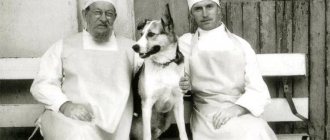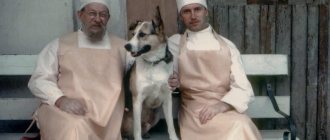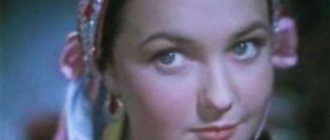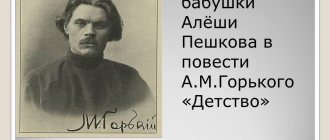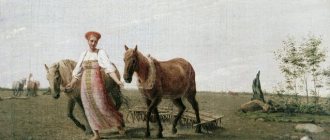In Mikhail Bulgakov’s story “Heart of a Dog,” Shvonder is far from the main character, however, his role is noticeable and partly it is he who becomes the reason for the denouement and Sharikov’s return to his “natural” appearance.
At the same time, the author himself, in the image of this proletarian, tried to combine the features of many “public figures” who at that time considered themselves the arbiters of human destinies and who hated everything that went beyond the scope of their proletarian worldview.
Contents of the story
The literary work describes the birth of socialism and the short period of NEP. The plot is based on three directions:
- fiction;
- dystopia;
- satirical pamphlet.
Fictional events take place in a real post-revolutionary environment. The scene is a large apartment in the center of Moscow on Prechistenka Street. Professor Preobrazhensky, providing rejuvenation services, is quite happily going through a difficult turning point surrounded by poverty and devastation.
As a result of a pituitary gland transplant operation performed by an outstanding surgeon, a good-natured, unpretentious mongrel turned into an aggressive humanoid creature with a disgusting character.
The great experiment of the great scientist did not produce positive results. Despite all the efforts to educate and develop Sharikov, it was never possible to create an adequate personality out of him. The author, with brilliant skill and talent, speaks about the emergence of an absurd situation in the event of human intervention in the laws of nature and the development of society. Bulgakov is critical of the process of creating a new type of man using violent methods.
Shvonder and his activities
At the next meeting of the housing association, Comrade Shvonder, a political fanatic, scoundrel and scoundrel, is elected as the new head of the house committee. Rejoicing and gloating, the hero begins to introduce his own rules in the “small” kingdom. In his tyranny, Shvonder achieves unimaginable heights: the house becomes dirty, people don’t care in the hallways, no one deals with the real problems. Amateur activities are organized among the residents - a choir that gathers to sing revolutionary songs. Shvonder holds all kinds of meetings, discussions, and speaks with loud slogans that he read in brochures and newspapers. Urgent issues of managing the house are not resolved, all matters are abandoned.
Appearance and behavior
A separate part of the emerging revolutionary working class contributed to many negative events in subsequent stages of social development. Shvonder's satirical portrayal makes the work interesting and gives it historical value. The type has become a household word to describe incompetent, uneducated, but at the same time self-confident individuals.
Shvonder is a typical representative of Soviet power . He works as chairman of the house committee in the house where Professor Preobrazhensky lives. His lack of education and bad manners are covered up by revolutionary appeals. Belonging to the lower social strata explains the character's desire for power. After the revolution, he tries to take a higher place in the social structure.
Shvonder is part of the overwhelming brute force that is gradually eliminating the remnants of the previous system. He hates the lifestyle of an intelligent professor, builds a new one, completely destroying the old society.
Bulgakov does not have a detailed description of the character. The character is a composite image of the proletariat that has come to power. A political fanatic is elected chairman of the house committee at a meeting of the housing association. Shvonder and his team are carrying out reforms using violent methods and see representatives of the intelligentsia as class enemies. The chairman bows and fawns over any authority that represents the law. The main thing for him is the presence of a document.
The external data of the character is given by the author quite schematically. Modest attire includes a black leather jacket, standard for the time. There is no description of the face in the story, only the conspicuous thick and dark hair is mentioned. The lack of culture is expressed in confused, illiterate speech , consisting mainly of a jumble of individual phrases and slogans.
The story describes the struggle between two warring camps. Arrogant and confident in their own importance, members of the house committee use power in resolving any issues. At the same time, scientists, Professor Preobrazhensky and Doctor Bormenthal, defend their well-established life and the possibility of conducting scientific experiments.
Characteristics of the hero
(Roman Kartsev as the chairman of the house committee Shvonder in the circle of “public persons”, film “Heart of a Dog”, USSR 1988)
The author outlines the appearance, character traits and everything that would help the reader get an idea of Shvonder as a person. He does not see the person behind him, but rather one of the elements of the emerging socialist system, striving to destroy the previous order as thoroughly and thoroughly as possible. And if this requires destroying someone, then... so be it.
(Shvonder and Professor Preobrazhensky)
When Sharikov needed to infiltrate society, Shvonder turned out to be the very guide for him, without whom it would have been extremely difficult to do this. The chairman of the house committee considers the document to be the most important. He says so directly to Preobrazhensky, and perceives the professor’s disagreement as an insult. Shvonder bows to the new government, firmly believes in what replaced the old gods - standards and documents. He is aggressive and not prone to reasoning. The obvious absurdity of the completed certificate issued to Sharikov eludes the chairman, although Philip Philipovich is convinced of the opposite - for him such “documents” are sheer nonsense.
The essence of the revolution in science made by Preobrazhensky has absolutely no meaning for the proletarian. The fact that yesterday's mongrel became a human is not perceived as a miracle. Sharikov is the unit of society. Therefore, Shvonder is concerned about him from a purely practical point of view. A new tenant needs registration in the apartment, and this very living space worries the chairman much more than any scientific discoveries. In a certain sense, the confrontation between Shvonder and Preobrazhensky is the most important guide of the plot of the story and the essence of the social conflict revealed by the writer.
Shvonder's activities
The work carried out by the housing association has become part of the general policy of bureaucratization of government institutions. It strengthened the negative attitude of the people towards management structures:
- Consolidation of the bourgeoisie. The hero is trying to move poor tenants into a large apartment. According to the chairman of the house committee, all people should have equal rights. For him, there is no difference between ordinary citizens and a talented scientist who has made the greatest discovery. Shvonder does not believe in scientific experiments and demands that a Polygraph be registered in the professor’s living space in order to register a human unit. A large, neat apartment does not give him peace. He seeks to reduce the living space of the class enemy, who has 7 rooms and a servant.
- He sees Sharikov as a person , and not as the result of an experiment. Shvonder demands that Polygraph provide documents and gets him a job cleaning up stray animals. Playing an active role in the “proletarian” education of the ward and his adaptation to the team, the Bolshevik supplies him with revolutionary literature and believes that it is better to educate the individual from a “blank slate”. The friendship between teacher and student ends with the writing of a denunciation against the professor. Due to his limitations, Shvonder does not understand that “insignificance” is a huge danger if directed in his direction by someone else’s teaching.
- Strictly complies with all decisions and decrees of the Soviet government. The head of a fanatic is filled with Marxist postulates, which are actively used in solving everyday issues. The character type is formed from the traits of individual representatives of the proletariat, who later became officials of the new formation.
- Participates in organizing meetings and rallies with choral singing and slogans about the rights and freedom of the working class. Lack of housework leads to destruction and dirt in the building, theft of flowers and galoshes, and power outages. Shvonder’s main task is not specific economic activity, but the fight against the bourgeoisie.
Bulgakov describes the period of destruction of old and violent introduction of new ideals, the romance of the revolution and the tragedy of the common people. The book clearly shows the author’s negative attitude towards Shvonder, a representative of the emerging new government.
Shvonder in the Heart of a Dog: image and characteristics
The short story The Heart of a Dog by Mikhail Afanasyevich Bulgakov has become almost the calling card of the eminent writer. The programmatic work, familiar to every Soviet and Russian person from school, is a sharp satire on the social situation of the turbulent time in which it was created. Naturally, the heroes drawn by Bulgakov on the pages of this story also reflect recognizable types of the era. In each of them, from Professor Preobrazhensky to Sharikov, one can discern a collective image of a certain class, people of the same upbringing, type of thinking and aspirations.
The writer portrays Shvonder, the chairman of the newly formed house committee, extremely vividly. The responsibilities of this person, who has neither proper education nor culture, is to distribute all available benefits among the residents. He first appears on the pages of the story when he finds himself on the threshold of the professor’s apartment along with his comrades. The four of them come to inspect the living space and resolve the issue of compaction. According to Shvonder, Preobrazhensky single-handedly occupies too much space, and could easily do without a dining room and an observation room, which looks like an unaffordable luxury in the eyes of young proletarians.
Preobrazhensky manages to defend his right to all the available rooms, but in a dispute with Shvonder he deeply offends the chairman, who no longer wants to leave the problem tenant alone. Without realizing this fact, the professor is faced with a completely new, incomprehensible type of consciousness: dark, ignorant, but aware of its own strength and power.
Shvonder's appearance is described quickly and briefly by Bulgakov: he is a young man with a furry head of curly dark hair. Shvonder is not distinguished by cleanliness; he performs his duties in organizing cleaning, supplying and meeting the needs of the house very poorly; he likes to achieve justice in his personal understanding and talk about the greatness of the new system. He especially likes the fact that now everyone is equal, and he, Shvonder, can be on friendly terms with the same Professor Preobrazhensky.
That is why it is subsequently so important for him to infringe on his class enemy. And Shvonder finds a way to do this through Sharikov. Having discovered a new tenant in Preobrazhensky’s apartment, the chairman begins to write scandalous articles for the press, declares Sharikov to be the illegitimate son of the professor and, finally, forces the former dog to acquire a document certifying that he is indeed a citizen of Sharikov Poligraf Poligrafovich, um, born in your, supposedly, apartment.
The attitude towards bureaucratic formalism especially emphasizes the essence of Shvonder; he is perfectly characterized by the following quote, which has become a catchphrase: A document is the most important thing in the world.
